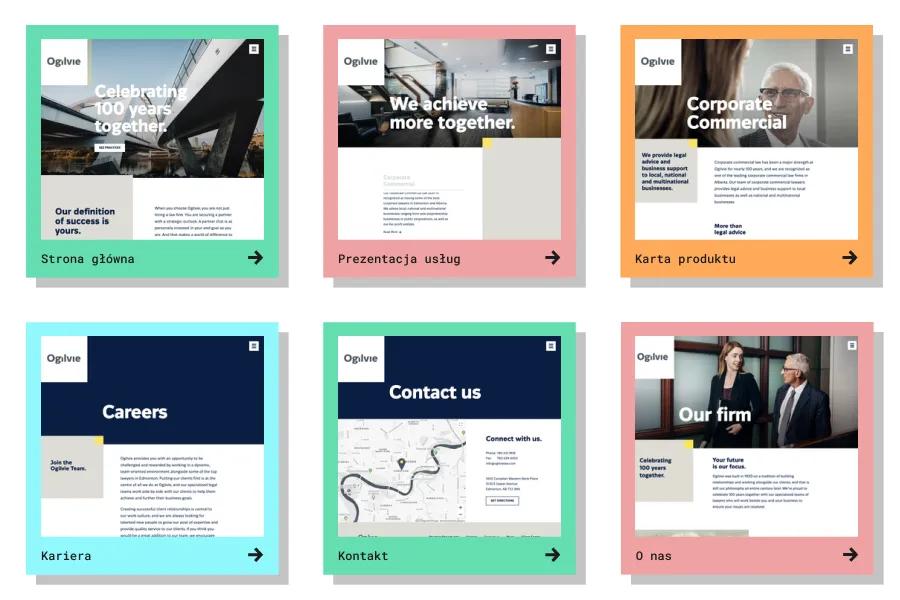Our main topic today is the design and optimization of websites of law firms in the age of Coronavirus. We can confidently say that the time has come for a change of thinking, tools, and ways of reaching customers.
It must be done if you want to create a new or optimize an existing law firm's website. While this is a prerequisite, you can't stop there.
In this article, we'll present a solution developed by our R&D team. A solution that will increase the Conversion Rate of law firms' websites in the age of Coronavirus. In a seperate article, we prepared a comparison of website development costs.
Legal services on the Internet — false beliefs of lawyers
Up until a decade ago, an argument stating that legal services would never be successfully provided online was pretty convincing. And certainly not on a massive scale. It was said (on trade portals, forums, discussion groups) that they're too peculiar, that the Internet doesn't help build the trust necessary between a lawyer and their client.
Stereotypes were repeated, according to which it's impossible to learn at a distance about the customer's problem (law firm websites were thought to be useless in this regard). Thus it's impossible to help them effectively.
There was a belief that image, credibility, and the complexity of the legal matter stood in the way, and no one or nothing could change that. This situation was compared to that of doctors, who were also very skeptical about providing medical services remotely.
The reluctance to use a new medium (initially, law firm websites were ordinary business card sites) could be seen both on the law firms' side and on clients. However, in just a few years, it turned out that the belief in the incompatibility of legal advice and the Internet wasn't built on solid fundaments.
Today it's known that most of these convictions proved to be simply false. They were built on fears and reluctance toward changing a well-functioning but a little outdated way of working. Time has tested these misguided approaches.
Websites for law firms or how to benefit from a pandemic
The first breakthrough occurred in providing legal services for individual customers. Sales of legal services through the Internet became a reality. Today, especially in the age of Coronavirus — B2B legal services have a chance to replicate this success. Some law firms already see an opportunity in this situation.
In our humble opinion, that's very good! The moment is ideal, although it seems inconvenient. Believe us; it's a perfect time to optimize law firms' websites in terms of even more effective sales of legal services. It only requires appropriate preparations. And a change of thinking.
Although the pandemic is a problem for most industries, in some, it can be a positive impulse to change the way of thinking, habits, and operation.
Remote work that turned out to be not only possible but equally effective and efficient is the best example of this.
Part of the problem is not the character of the industry but the nature of habits and stereotypes prevailing in the given industry.
If history is to teach us anything, it should be it. Impossible things seem impossible to do until someone who does them appears. And that's us! ;)
Legal services have become overgrown with such fixed beliefs, and it's time to verify them. However, before we present you with opportunities that lay before law firms and their websites, we'll tell you briefly about a few issues that clearly work to the advantage of lawyers, legal advisors, and law firms themselves.
The character of the legal services market
As mentioned above, law firms providing services to individual clients were the first to open up to offer remote services. It quickly became apparent that Internet users actively search for legal advice.
And their interest in legal knowledge and advice grew along with access to the Internet and the ability to browse the web on various devices. Their motivations also became clear pretty quickly. They look for legal knowledge and advice on the Internet when they:
- Broke the law or are concerned that they did
- Don't want to break the law, but they're not sure which regulations apply in given situations
- Don't have access to the specialized stationary legal offer (e.g., in small towns, villages)
- Are embarrassed to seek legal advice
- Can't access legal advice because of economic reasons
- Want to save money and simultaneously not lose the quality of the legal service.
Initially, the scope of legal services was narrow and included typical legal advice (usually regarding civil law) and didn't go beyond drafting typical documents. Currently, online lawyers provide services from the following fields:
- Administrative law
- Copyright law
- Construction law
- Civil law
- Economic and commercial law
- Family and guardianship law
- Tax and customs law
- Criminal law.
Many law firms have specialized in remote service. Their websites and web applications are primarily effective sales tools. And what's even more important, their scope of operation concerns legal problems with increasingly higher complexity.
Everything indicates that the development of LegalTech (services, technologies, and solutions dedicated to the legal industry) will broaden this scope even more. And, at the same time, reducing human participation in the whole process.
As a side note, we just want to add that the USA tries to use artificial intelligence to develop solutions dedicated to the legal industry. So far, without great success, but that time will come sooner or later. It's just our opinion.
Although the widespread use of AI in legal consulting is still a distant future, today, a change on both sides has become a fact. Lawyers change, and clients follow in their footsteps — the openness, convenience, affordability, accessibility, and popularity speed up this process.
A new type of lawyer — sales of legal services on the Internet
Jakob Nielsen, "Usability 101: Introduction to Usability."
A new generation of lawyers and legal advisors who were raised with the Internet, applications, and software facilitating access to up-to-date legal knowledge, supporting the management of law firms, and drafting typical documents (procedural documents, contracts, regulations) and even supporting processes (e.g., debt collection processes) approach new technologies, solutions, and possibilities with more enthusiasm.
Lawyers of the new type are more open to working with a virtual client. They appreciate the automatization of some processes and the flexibility of running the law firm.
For them, the company's website isn't an addition to the stationary firm. They think of it as a law firm in the full sense of the word.
The apparent generational change concerns not only the approach to the medium but also the essence of the profession itself, which ceases to be seen as a mission, an ethos.
Instead, it's beginning to be recognized as a strictly business activity that is aimed at effectiveness, profits, and competitiveness.
Modern technology, research, knowledge, and solutions are starting to be seen as supporters of business development and tools for more effective commoditization of legal services.
Even more importantly, "digital lawyers" are increasingly playing an essential role in the decision-making process regarding strategic actions (e.g., ways of competing).
In other words, in the fight for the client, their way of working, approach, preferences, and attitudes toward law firms' websites will determine market norms and standards. And they will be top-notch.
In this competition, the winners will be or already are, only those law firms that make their websites a tool that is:
- Effective for sales
- Informative
- Effective for building an image
- Increasing the scope
- Useful
- Friendly
- Providing positive experiences during the use (UX — User Experience).
Along with the new type of lawyers, a new way of acquiring legal services can be observed. Law firms who work with big and demanding clients increasingly experience and need to account for decreasing loyalty.
Customers who have a lot of law firms to choose from are increasingly more aware and demanding (the phenomenon of the so-called informed and involved client) and increasingly often look for law firms by themselves. And for this purpose, they primarily use the Google browser.
What websites in the Google browser are in the top 10? Only those that meet the standards of the search engine, and it definitely bets on UX. Google already quantifies the usability of law firm websites, and we wrote about it here.
A law firm that can't advertise itself will have to simply rely on factors that will allow it to take a high position in the engine and thus reach a larger number of clients — both individual and business ones. And in turn, a law firm with a high position in Google must provide services of the highest quality.
Coronavirus changes the legal market — research of Professor Ryszard Sowiński
Another variable that currently has had the strongest impact on how law firms are run, their websites, and the acquisition of new clients is the pandemic crisis.
Even the biggest optimists believe that stabilization of the situation and a return to normalcy is not a matter of months, a year, but at least several years.
Pessimists say that we will wait at least a decade, and extreme pessimists, who, in my opinion, are significantly exaggerating, think that things will never be normal again. We need to wait and see in the meantime...
Surviving the crisis for many law firms can be difficult without taking actions that are:
- Quick (possible to perform in a short time)
- Specific (that allow them to undertake adaptive actions)
- Affordable
- Effective (that in a short time result in a considerable return on investment — ROI).
We'll discuss our "covid vaccine" in a moment. In the meantime, we'll talk about fascinating research that presents how the legal industry looks and provides insight into law firms' actions.
After all, operations of the competition and market tendencies are one of the most vital variables that should be considered when creating an operations strategy. Right? Exactly.
Coronavirus will not change but force law firms to have an increased presence on the Internet and "convert users of sites into clients." It's not just our hunch. Professor Ryszard Sowiński, the author of the study "Koronawirus a rynek prawniczy. Badanie rynku usług prawniczych" (Coronavirus and legal market. Legal services market research) is of the same opinion. And he has convincing evidence to support it.
So, what are his findings?
The crisis has left its mark on the entire industry, regardless of:
- Size
- Specialization
- Structure of clients (individual, B2B, institutions) of a given law firm.
According to Prof. Sowiński, the industry's reactions to the pandemic crisis take a few forms. From a) paralysis, resignation, b) passive waiting for change, to c) actively trying to turn the crisis to their advantage.
In his study, Prof. Sowiński asked four important questions, namely:
- How the covid crisis influences law firms?
- What reactions does it create?
- What changes has the crisis created in the behavior of law firm clients?
- What feelings prevail among the lawyers?
In our opinion, the most interesting matter discussed in this study is how to deal with this new situation. According to Prof. Sowiński, law firms who passively wait for the change of situation usually use this time to order their internal matters. Maybe from the perspective of short-term goals, these actions aren't bad.
When looking at it from a long-term perspective, these actions don't let firms adapt to the situation in any way. They don't allow them to function effectively and don't indicate any goals. To put it bluntly, it's a highly risky and demotivating strategy. We definitely don't recommend it.
Inaction as a reaction to such a deep and long-lasting crisis is a perfect recipe for falling out of the market and being marginalized. It's an action calculated for survival, an action on the brink of survival.
Unfortunately, it's a decision made out of their own accord. However, its consequences can be severe. Many law firms will realize their mistake too late.
However, we support (just like Professor Sowiński) the strategy in which a law firm actively approaches a new situation. By betting on the following:
- Developing new services
- Broadening specialization
- Acquiring new customers in a new digital way
- Reinforcing relationships with already possessed clients.
This kind of approach provides a clear sense of the following:
- Goal
- Agency
- Capabilities
- Control over the situation.
From the perspective of the "morale" of lawyers and law firms and the entire industry, it's crucial. Because it counteracts pessimism, which is quite common. The emotional state of the industry is not the best.
This is what Professor Sowiński's study shows. The sense of an abrupt change in previous ways of doing things, attitudes, and visions of the future is omnipresent. And this is a negative feeling that you absolutely cannot succumb to.
Fortunately, the study also reveals something positive. Some firms approach the crisis optimistically and are rationally using their websites. In the long term, they see their opportunity and actively seek solutions.
This perfectly aligns with the attitude of the Professor, who doesn't succumb to dark thoughts and provides accurate advice to the entire industry. The researcher's recommendations are divided into 6 "segments." For example, in terms of "Promotion and Sales," he advises, among others:
- Using the crisis to acquire and test new marketing skills
- Utilize more online channels, promotion, and sales tools more intensively.
Simply put, we can't agree more with the Professor!
If the covid crisis is a challenge, then the Internet (as a channel) and a website (as a basic tool for sales and promotion) are the best way to deal with it. We agree with Professor Sowiński's suggestions as specialists, practitioners, and researchers of websites. We've also approached the issue in a serious and scientific way.
So, how to design law firms' websites?
Although our research was based on a different methodology and involved a different subject, it had a very similar goal. We wanted to:
- Discover all factors responsible for the low conversion rate of websites
- Create a complete list of Low Conversion Indicators.
- Make a list of Optimization Guidelines for the Legal Industry.
The long list of questions we posed helped us achieve our goal. Among others, we wanted to find out:
- What can a law firm do to get more clients through websites in the current situation?
- How to increase the conversion rate in the legal industry in the age of Coronavirus?
- How to optimize conversion on a law firm's website?
- How to increase the number of leads acquired with a contact form?
- To what extent does the design of a law firm's website affect the emotions and behavior of its users?
- To what extent can the site's technology support or hinder conversion?
- How to create understandable and accessible content on a law firm's website?

We needed time and hard work to obtain reliable, credible, and representative (for the studied and analyzed industry) results.
During the study, we performed audits on over 50 websites of companies that successfully provide B2B services, including law firms' websites. Each of them is a source of inspiration and best practices:
- Allen & Overy (76 best practices)
- Foundlegal (65 best practices)
- HopgoodGanim Lawyers (91 best practices)
- Ogilvielaw (40 best practices)
- Sidley (52 best practices)

As a result, we selected over 400 recommendations and formulated based on them Optimization Recommendations which help diagnose a website in terms of the following:
- Information Architecture — legibility of text blocks, graphics, infographics, photos, speed of reaching information
- Content Experience — accessibility of language, understandability of names, advertising slogans, headlines, links, and call-to-action buttons
- Conversion Blockers — functional ones and those regarding cognitive strain
- Accessibility — for users with various disabilities
- Emotions and feelings — e.g., the level of trust inspired by lawyers
- Intuitiveness and easiness of navigation
- Layout — the structure of the home page, offer subpages, and those describing the law firm, team, and contact subpages
- Responsiveness — correct display on mobile devices
- Page loading speed
- Usability — to what extent the information, the way it's presented, responds to the user's problems.
We used several standard methods in the study: Nielsen's heuristics, Cognitive journey for the web version, and we supplemented the whole with data from the NN Group's report "B2B Website Usability for Converting Users into Leads and Customers."
Thus, a tool was created to diagnose and fix errors that occur on law firms' websites. Critical errors that lower the conversion rate and determine the "be or not to be" of law firms in the age of Coronavirus.

While analyzing a website, we can identify elements and functionalities that make users abandon it or consider it unfriendly and useless or deem it unable to solve their business problem.
The best practices we've collected are available on our R&D subpage, and we've created a UX Audit service for law firms that want to check the result of their websites and find out what will improve their conversions.
What will be the result of our work? What will you gain?
- Description of the decision-making process of a B2B client
- Description of characteristics of the company's image, which the template of a website should include to meet the expectations of a B2B customer
- Report with a list of errors
- Recommendations on what should be improved in a particular template to attract more clients.






